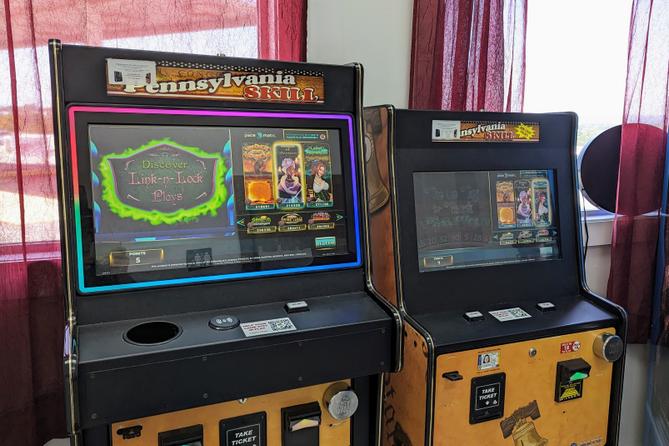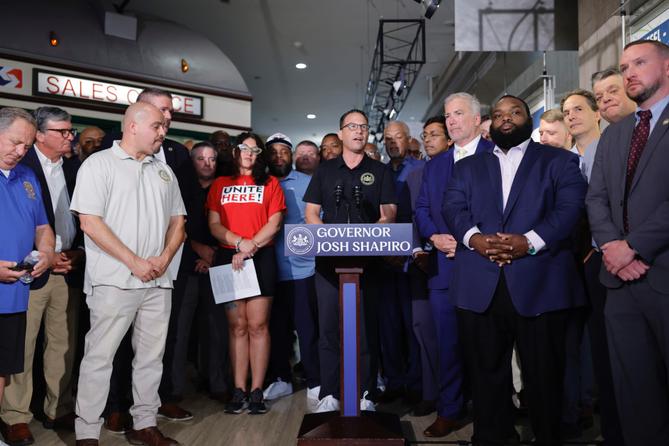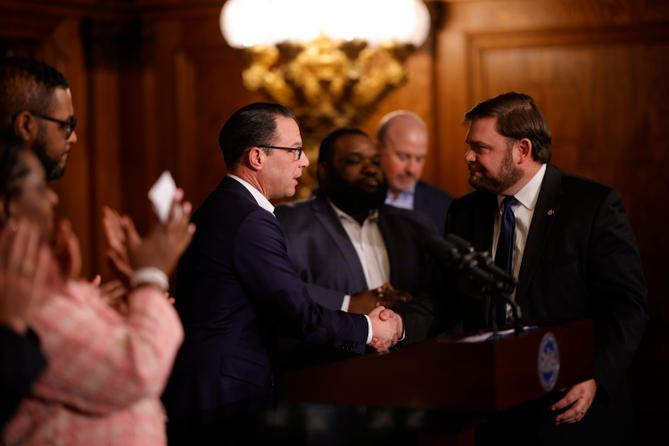HARRISBURG — As another acrimonious week ends in Pennsylvania without a finished budget, Democrats and Republicans have dug in on conflicting positions around the session’s top issue: money for public transit.
GOP lawmakers who control the state Senate want to pull hundreds of millions of dollars from a special public transit fund to help SEPTA and other struggling agencies cover operating costs. Democrats say it’s unacceptable to touch money earmarked for capital projects. Instead, they want to divert sales tax money to pay for operations — something Republicans have dismissed outright.
A third option, one palatable to both sides, has yet to emerge. There is at least one other revenue option that could cover transit’s needs, but it has gotten tangled in complicated politics: regulating and taxing slot-like skill games.
Pressure is mounting.
Schools and counties say they’re preparing to make financial sacrifices without billions in payments from the state. Meanwhile, lawmakers have missed a deadline set by the state’s largest transit system, Philadelphia’s SEPTA, to come up with a plan to avert dramatic cuts.
This isn’t the first time SEPTA and other transit agencies have said they were on the verge of a serious crisis. When it last happened, in late 2024, Democratic Gov. Josh Shapiro flexed federal highway funding as a stopgap to cover immediate expenses.
While the federal funding still exists, the political realities of redirecting it for transit may have changed. Joe Biden, a Democrat allied with Shapiro and sympathetic to funding transit, was still president when Shapiro used the money last year. Now, President Donald Trump’s White House and Federal Highway Administration would need to approve the switch.
Lawmakers say talks will continue.
At an appearance in Luzerne County on Friday, Shapiro told reporters, “I was in the Capitol yesterday talking to leaders. I was in Harrisburg this morning. I'm here with you now. I'm going to be on the phone with the leaders again this afternoon, and I assume throughout the weekend. My job is to try and bridge the gap.”
“We're going to keep pushing hard throughout the weekend and hopefully get this done soon,” he added.
Here’s what has been placed on the table, and what each conflicting proposal would mean for Pennsylvania’s larger budget picture.

Taxing skill games
In his February budget speech, Shapiro proposed two major new sources of revenue to cover rising costs: legalizing recreational marijuana and taxing slot-like skill games.
While cannabis was quickly off the table, GOP leaders in the state Senate publicly embraced the latter idea, pitching a 35% tax rate on revenue — much higher than industry lobbyists want.
Last month, conflicts between chamber leaders and skill games backers spilled into the open after a failed meeting. Pace-O-Matic, the key skill games player in the commonwealth, rejected the proposal; its chief public affairs officer, Michael Barley, then accused Republican leaders of threatening the company’s lobbying firms with retaliatory action unless they dropped Pace-O-Matic as a client.
Since then, internal discussions among the caucus about regulating skill games have quieted, two sources with knowledge of those discussions said.
The state Senate’s conflict over skill games isn’t just with lobbyists — it’s also internal.
Some lawmakers live in districts with casinos, which pay a roughly 50% tax rate and want skill games to do the same. Others have aligned themselves with the skills industry, they say, to support manufacturing and small clubs like veterans’ organizations that depend on the revenue. Others oppose the existence of the machines, period.
These factional differences have contributed to making it difficult for the state Senate to act.
“It sounds a lot easier when you're discussing it around a table in Harrisburg,” Barley told Spotlight PA this week. “But when you start to flesh it out … it’s a lot more difficult.”
It may not be completely off the table. State Sen. Scott Martin (R., Lancaster), who chairs the upper chamber’s Appropriations Committee, told Spotlight PA, “I know they're working hard at trying to find middle ground on that … This issue has been battled back and forth.”
State Sen. Gene Yaw (R., Lycoming), whose district is home to a major skill games manufacturer and who supports the industry-backed lower tax rate, recently pitched a bill that would establish a monthly fee for skill games instead of a tax, and would limit the number of machines that can exist statewide.
It would still bring in around $300 million a year, he estimated, adding that he’s just trying to find a solution. His leadership hasn’t weighed in on the idea.
“To say that we need money in the budget in general, and then to say, ‘But we don't want this money’ — that's the concept I don't get,” he said.
More sales tax revenue
Both Shapiro and state House Democrats want to send nearly $300 million more to public transit agencies by increasing the percentage of the commonwealth’s sales and use tax revenue they get.
The state already provides these agencies with about $2 billion in direct aid.
The vast majority of Pennsylvania’s considerable sales tax revenue isn’t earmarked for a specific purpose — it flows directly into the state’s general fund, where it joins the pool of money used to pay the state’s bills. The chunk of sales tax revenue earmarked for transit is a budgetary exception to the rule.
A bill the state House advanced this week would increase the portion of the tax that flows to trains, trolleys, and buses across the state by 1.75% — a $292.5 million increase. The measure would send up to 0.25% of the tax revenue — roughly $41.8 million — into a fund for roads and bridges.
This change wouldn’t directly route money away from other programs. However, it would mean the state doesn’t have as much money for other uses.
And that has been a nonstarter for Republicans, who note that Pennsylvania is already running a structural deficit in which it spends more than it takes in every year.
“What tax does the governor plan on raising on the people of Pennsylvania, if they create a $300 million hole in the general budget?” state Senate President Pro Tempore Kim Ward (R., Westmoreland) recently asked on a radio show.
Martin, the state Senate Appropriations chair, takes issue with the fact that Democrats’ proposed funding plan would be permanent — more of the state’s sales tax revenue would go to mass transit in perpetuity.
“We’ve provided you with a lot of money on an annual basis, and you’re asking for a lot more money,” Martin said on the state Senate floor, “despite the fact … we’re grappling with a $3 billion structural deficit.”

Taking money from the capital funds
Republicans answered Democrats’ proposal with their own pitch this week, passing a bill that would pull money from a fund for long-term transit projects and interactive gaming revenue.
Over this fiscal year and next, the measure would pull $419 million for transit from a fund designed to cover agencies’ longer-term capital projects, like buying new trolleys and modernizing train lines. The bill would also have a total of $173.5 million in gaming revenue flow to transit during that period.
The bill would make an equal investment in roads and bridges, pulling another $419 million out of the capital transit projects fund for that purpose this year and next, along with another $173.5 million in gaming revenue.
State Senate Republicans say that the size of the Public Transportation Trust Fund (PTTF), which pays for transit systems’ operations and capital expenses, has been steadily increasing over the past decade, going from $374 million in June 2015 to $2.4 billion this year. If the fund has a surplus of money, they say, it should be used to tide over public transit agencies in dire straits.
“If we have an account set up for one thing in particular, and … it goes gangbusters, and it's bringing in a lot more money than it can ever spend, then we need to look at that, and may have to change the law to redirect stuff,” Martin told Spotlight PA.
But state Secretary of Transportation Mike Carroll said that the size of the PTTF is deceptively large. The money isn’t just surplus, he said — it’s already allocated to long-term projects.
“That creates a huge problem when it comes to the capital needs across this commonwealth, and it does not solve the operating challenges,” Carroll told the state House Appropriations Committee of the Senate GOP’s plan.
SEPTA General Manager Scott Sauer explained that “every dollar that SEPTA receives, we allocate to a project.” However, some projects take decades to complete and rely on matching federal funds, Sauer said, which means SEPTA needs to prove that it can pay for the project by keeping unspent money in its reserves.
About $1.5 billion of SEPTA’s $2.5 billion revenue last year came from the state government. While most of those state funds go toward day-to-day operations, about $417 million is allocated to capital projects. Overall, the system allocated more than $900 million for capital projects last year.
“There's a danger in flexing capital dollars,” Sauer told reporters on Tuesday. “Our entire rail fleet is due for replacement, and we have to exercise this capital program in a manner that keeps the system safe forever.”
SEPTA spokesperson Andrew Busch told Spotlight PA that the agency hasn’t gotten to the point of deciding which projects would be interrupted, but it could range from procuring new trains for major lines or modernizing infrastructure for trolleys.
The state Senate bill would also mandate a range of policy changes for public transit agencies, including a mandatory fare increase every two years, increased penalties for drug use on public transit, and annual performance reviews.
